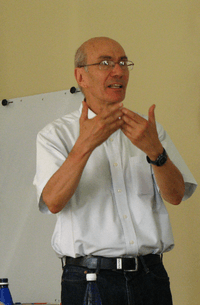Stephen Stich

Stephen Stich (born May 9, 1943) is a professor of Philosophy at Rutgers University. He is also currently an Honorary Professor of the department of Philosophy at the University of Sheffield. Stich's main philosophical interests are in the philosophy of mind, cognitive science, epistemology, and moral psychology. He is arguably best known for his contributions to philosophy of mind. His 1983 book, From Folk Psychology to Cognitive Science: The Case Against Belief, received much attention as he argued for a form of eliminative materialism about the mind. However, he has since modified his position, especially in his 1996 book Deconstructing the Mind.
Biography
Stephen Stich attended the University of Pennsylvania from 1960-1964 where he was a member of the Philomathean Society. He received his B.A. in 1964 (Summa Cum Laude with distinction in Philosophy). After attending Princeton University from 1964–1968, he received his Ph.D. in 1968.[1]
Stich has taught at several universities, including University of Michigan, University of Maryland, College Park, University of California, San Diego, University of Sheffield, and Rutgers University.
Stich joined the department of philosophy at the University of Sheffield in February 2005 as an Honorary Professor. He remains primarily at Rutgers, but will visit Sheffield on a regular basis to teach and work with the Hang Seng Centre for Cognitive Studies.[2]
In 2007 he was awarded the Jean Nicod Prize and gave a series of lectures in Paris titled Moral Theory Meets Cognitive Science: How the Cognitive Science Can Transform Traditional Debates.[3]
Work
Stich is primarily known in philosophy for his work in the philosophy of mind, cognitive science, epistemology, and moral psychology. In philosophy of mind and cognitive science, Stich (1983) has argued for a form of eliminative materialism—the view that talk of the mental should be replaced with talk of its physical substrate. Since then, however, he has changed some of his views on the mind. See Deconstructing the Mind (1996) for his more recent views. In epistemology, he has explored (with several of his colleagues) the nature of intuitions using the techniques of experimental philosophy, especially epistemic intuitions that vary among cultures—see Stich (1988) and Stich, et al. (2001). This work reflects a general skepticism about conceptual analysis and the traditional methods of analytic philosophy. In The Fragmentation of Reason he briefly sketched a form of epistemic relativism "in the spirit of pragmatism."[4]
He and Shaun Nichols are responsible for a theory of how humans understand the mental states of ourselves and others, or mindreading, which they present in Nichols and Stich (2003). Their theory is a hybrid, containing elements of both the simulation theory and theory theory, and also aims to explain the mental architecture that enables pretence.
Selected publications
- 1972, "Grammar, Psychology and Indeterminacy", Journal of Philosophy, LXIX, 22, pp. 799–818.
- 1978, "Empiricism, Innateness and Linguistic Universals", Philosophical Studies, Vol. 33, No. 3, pp. 273–286.
- 1978, "Beliefs and Sub-Doxastic States", Philosophy of Science, Vol. 45, No. 4, pp. 499–518.
- 1979, "Do Animals Have Beliefs?" The Australasian Journal of Philosophy, Vol. 57, No. 1, pp. 15–28.
- 1983, From Folk Psychology to Cognitive Science: The Case Against Belief, MIT Press.
- 1985, "Could Man Be An Irrational Animal?" Synthese, Vol. 64, No. 1, pp. 115–135.
- 1988, "Reflective Equilibrium, Analytic Epistemology and the Problem of Cognitive Diversity", Synthese, Vol. 74, No. 3, pp. 391–413.
- 1990, "Connectionism, Eliminativism and the Future of Folk Psychology", Philosophical Perspectives, Vol. 4, pp. 499–533. (with William Ramsey & Joseph Garon)
- 1990, The Fragmentation of Reason: Preface to a Pragmatic Theory of Cognitive Evaluation, MIT Press.
- 1992, "What Is a Theory of Mental Representation?" Mind, Vol. 101, No. 402, pp. 243–61.
- 1993, "Naturalizing Epistemology: Quine, Simon and the Prospects for Pragmatism", in C. Hookway & D. Peterson (eds.), Philosophy and Cognitive Science, Royal Institute of Philosophy, Supplement no. 34 (Cambridge: Cambridge University Press), pp. 1–17. Online text
- 1996, Deconstructing the Mind, Oxford University Press. Chapter 1 online
- 1998, "The Flight to Reference, or How Not to Make Progress in the Philosophy of Science", (with Michael Bishop) Philosophy of Science, Vol. 65, No. 1, pp. 33–49. Online text
- 1998, "Theory Theory to the Max", (with Shaun Nichols) Mind and Language, Vol. 13, No. 3, pp. 421–49. Online text
- 2001, "Jackson's Empirical Assumptions", (with Jonathan Weinberg) Philosophy and Phenomenological Research, Vol. 62, No. 3, pp. 637–643. Online text
- 2003, Mindreading, (co-authored with Shaun Nichols) Oxford University Press.
- 2006, "Two Theories about the Cognitive Architecture Underlying Morality", (with Daniel Kelley), Online Philosophy Conference, Online PDF (presently 404)
- 2012, "Collected Papers, Volume 2: Knowledge, Rationality, and Morality, 1978-2010", Oxford University Press, 2012, ISBN 9780199733477.
See also
References
- ↑ Background education information from Stich's curriculum vitae (PDF).
- ↑ Information from Stich's profile at University of Sheffield.
- ↑ Archives Audiovisuelles de la Recherche, Stephen Stich, Moral Theory Meets Cognitive Science: How the Cognitive Science Can Transform Traditional Debates (full video coverage)
- ↑ Ch. 6 p.129 of The Fragmentation of Reason: Preface to a Pragmatic Theory of Cognitive Evaluation
External links
- Stich's profile at Rutgers
- Stich's web site at Rutgers
- Stich's profile at the University of Sheffield
|